|
|
|
Sort Order |
|
|
|
Items / Page
|
|
|
|
|
|
|
| Srl | Item |
| 1 |
ID:
165906
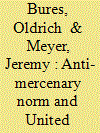

|
|
|
|
|
| Summary/Abstract |
This article offers an analysis of the influence of the anti-mercenary norm on the United Nations’ use of services provided by private military and security companies (PMSCs). It follows a constructivist approach which focuses on violations of the anti-mercenary norm within the UN system and on the justifications and condemnations of these violations in official UN documents. The findings suggest that while the anti-mercenary norm is no longer puritanical, two key aspects of the norm—the lack of a proper cause and the lack of control—remain influential within the UN system. Although all parts of the UN system nowadays routinely use a wide variety of services of PMSCs and the UN Secretary-General officially sanctioned security outsourcing in 2011, the UN continues to insist that it is only using PMSCs as a last resort, when no other options are available. The continuing need to justify the use of PMSCs’ services suggests that this practice challenges both the long-established identity of the UN as a key anti-mercenary norm entrepreneur and its ontological security.
|
|
|
|
|
|
|
|
|
|
|
|
|
|
|
|
| 2 |
ID:
109996
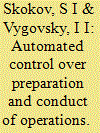

|
|
|
|
|
| Publication |
2011.
|
| Summary/Abstract |
The authors examine an automated control system for preparing and conducting military operations; and identify ways they consider essential for improving control efficiency.
|
|
|
|
|
|
|
|
|
|
|
|
|
|
|
|
| 3 |
ID:
170012
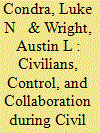

|
|
|
|
|
| Summary/Abstract |
What affects civilian collaboration with armed actors during civil war? While theory and evidence confirm that harm by armed actors influences when and with whom civilians collaborate, we argue that collaboration is also a function of civilians’ perceptions of armed actors’ efforts to minimize collateral casualties. We test this argument using a series of nationwide surveys of Afghan civilians conducted quarterly between 2013 and 2015. Our data record civilian willingness to report roadside bombs to government authorities and perceptions of government and Taliban efforts to minimize civilian harm. Civilians are less (more) willing to collaborate with the government when they perceive the government (Taliban) carelessly using force, even after accounting for political sentiment, local security conditions, and a range of additional confounding factors. Moreover, our evidence suggests that perceived carelessness in the rival’s area of control influences collaboration. We discuss how these empirical results inform broader literatures on collaboration, conquest, occupation, and control.
|
|
|
|
|
|
|
|
|
|
|
|
|
|
|
|
| 4 |
ID:
145487
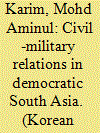

|
|
|
|
|
| Summary/Abstract |
The aim of this paper is to conceptualize a comparative framework on civil-military relations (CMR), at both political and strategic levels, in the context of major South Asian states such as India, Pakistan, and Bangladesh. There are complexities involved in framing and explaining power relations between political/ bureaucratic and military elites in these countries. Methodology used in this paper is basically content analysis, interviews, and observations made, and inferences drawn by the author himself, given his professional experience. The paper concludes there are both similarities and dissimilarities in such relations between democratic and quasidemocratic or between liberal and illiberal polities.
|
|
|
|
|
|
|
|
|
|
|
|
|
|
|
|
| 5 |
ID:
114042
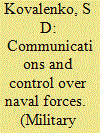

|
|
|
|
|
| Publication |
2012.
|
| Summary/Abstract |
The author discusses the specifics of communication with naval forces in various environments. He shows ways of improving naval communications facilities in view of the interservice standardization of the Russian Armed Forces' control system.
|
|
|
|
|
|
|
|
|
|
|
|
|
|
|
|
| 6 |
ID:
100052
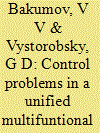

|
|
|
| 7 |
ID:
082796
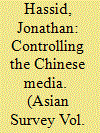

|
|
|
|
|
| Publication |
2008.
|
| Summary/Abstract |
Increasing economic liberalization of the Chinese media has not resulted in proportional political liberalization, and previous explanations for the state's puzzlingly firm grip are inadequate. This article argues that a "regime of uncertainty" is critical toward keeping the Chinese media in line
|
|
|
|
|
|
|
|
|
|
|
|
|
|
|
|
| 8 |
ID:
089896
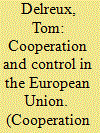

|
|
|
|
|
| Publication |
2009.
|
| Summary/Abstract |
This article examines the internal decision-making process in the European Union when the EU participates in international environmental negotiations. More particularly, the practical functioning of the relation between the member states and the EU negotiator (i.e. the Commission, the Presidency or a lead country), representing the member states externally, is examined. Starting from principal-agent theory and based on empirical research on eight EU decision-making processes with regard to international environmental negotiations, the article argues, first, that control by the member states on the EU negotiator takes place most manifestly during the course of the international negotiations, and, second, that these ad locum control mechanisms perform not only a control function, but also a cooperation function.
|
|
|
|
|
|
|
|
|
|
|
|
|
|
|
|
| 9 |
ID:
157719
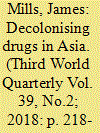

|
|
|
|
|
| Summary/Abstract |
This article examines a drugs trade in Asia that has been largely forgotten by historians and policy-makers, that in cocaine. It will briefly trace some of the contours of this commerce and the efforts to control it. It will also assess how successful these efforts were. The article is designed to contribute fresh perspectives on recent controversies in the historiography of drugs in Asia to argue that the agendas and agency of consumers are central to understanding why markets have formed there for psychoactive substances in the modern period.
|
|
|
|
|
|
|
|
|
|
|
|
|
|
|
|
| 10 |
ID:
173720
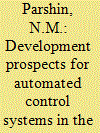

|
|
|
|
|
| Summary/Abstract |
This paper analyzes aspects of introducing information technologies in automated troop and weapon control, and examines ways of achieving interaction between control objects when automated control systems of Missile Forces and Artillery (MF&A) are in operation.
|
|
|
|
|
|
|
|
|
|
|
|
|
|
|
|
| 11 |
ID:
133232
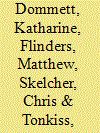

|
|
|
|
|
| Publication |
2014.
|
| Summary/Abstract |
Attitudes to quangos are paradoxical. On the one hand they are perceived to be undemocratic, unaccountable organisations, while on the other they are seen to improve effectiveness, limit political interference and increase public confidence in government. This paradox is reflected in the behaviour of political parties, which generally adopt a harsh line towards quangos in opposition, but come to rely on these bodies in office. Ahead of the 2010 general election it was, however, noticeable that the Conservative party rejected this dynamic by promising to pursue 'a more sophisticated approach'. This article explores the Coalition government's subsequent 'public bodies reform programme', assessing its progress against recommendations contained within the Institute for Government's Read before Burning report of July 2010. It concludes that while the Coalition has addressed long-standing concerns about the day-to-day governance of public bodies, it has failed to resolve a set of broader and strategic (metagovernance) issues.
|
|
|
|
|
|
|
|
|
|
|
|
|
|
|
|
| 12 |
ID:
040243
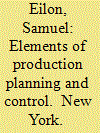

|
|
|
|
|
| Publication |
New York, Macmillan Company, 1962.
|
| Description |
viii, 587p.Hbk
|
|
|
|
|
|
|
|
|
|
|
|
Copies: C:1/I:0,R:0,Q:0
Circulation
| Accession# | Call# | Current Location | Status | Policy | Location |
| 008994 | 658.503/EIL 008994 | Main | On Shelf | General | |
|
|
|
|
| 13 |
ID:
151193
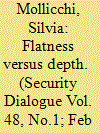

|
|
|
|
|
| Summary/Abstract |
For the past two decades, the camouflage patterns used on military uniforms have been computed by families of algorithms. The article argues that these computation methods fit within a genealogy of discourses on camouflage practices, which the text reconstructs along the axes of flatness and depth. Camouflage can be explained as an attempt at flattening information related to a target onto the underlying background, by producing general invariances within the environment and in accordance with the observer’s perceptive faculties. Carrying out this task, static camouflage responds to the aporia of using one pattern to disguise presence within multiple contexts. After analysing two discourses on camouflage in relation to the notion of flatness, the article considers a case of algorithmically generated static camouflage. Its disguising method abstracts information from both the environment in which an army is expected to fight and the observer’s perceptive capacities and then computes these threads of abstraction together in a pattern. The meshing function of computation thus flattens the principles embedded in the fabric, making them individually illegible. This changes the value that camouflage usually gives to target/background relations and to the observer’s perceptive faculties.
|
|
|
|
|
|
|
|
|
|
|
|
|
|
|
|
| 14 |
ID:
174063
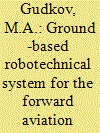

|
|
|
|
|
| Summary/Abstract |
This paper examines the ground-based robotechnical system (RTS) of the forward aviation gunlayer for guiding aircraft during air support of troops. It gives the distinctive features of its location on the ground and interaction with control points in the responsibility area of combined-arms formations. It also shows the tasks and functional peculiarities of various subsystems of the robotechnical system when homing the flying vehicle.
|
|
|
|
|
|
|
|
|
|
|
|
|
|
|
|
| 15 |
ID:
138199
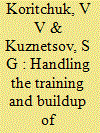

|
|
|
|
|
| Summary/Abstract |
The authors look at issues of improving control over mobilization resources training and buildup in the course of the ongoing army reform in the Russian Federation.
|
|
|
|
|
|
|
|
|
|
|
|
|
|
|
|
| 16 |
ID:
144924
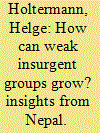

|
|
|
|
|
| Summary/Abstract |
How can insurgent groups that are militarily far weaker than the state survive and grow? Influential accounts drawing on Kalyvas' “control-collaboration” model argue that limited state reach can make this possible by allowing rebel groups to carve out pockets of control where they can elicit collaboration. I suggest that this account is inadequate. Even states with limited reach are likely to transfer sufficient forces to rebel-affected areas to establish at least partial control. Weak rebels therefore often face the challenge of building capacity without local control to begin with. I identify two broad factors that can make this feasible: first, strong pre-existing rebel networks, which facilitate collaboration through solidarity, norms of reciprocity, and social incentives; and second, counterinsurgency policies and practices that fail to exploit the opportunities that control offers for incentivizing collaboration and shaping political preferences. These arguments are grounded in a fieldwork-based case study of insurgency processes in a hamlet of Rolpa, Nepal.
|
|
|
|
|
|
|
|
|
|
|
|
|
|
|
|
| 17 |
ID:
186079
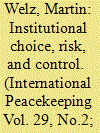

|
|
|
|
|
| Summary/Abstract |
Using institutional choice theory, this article seeks to explain why the G5 Sahel, an international organization that comprises Burkina Faso, Chad, Mali, Mauritania, and Niger, was created in 2014 and tasked to deal with conflict management in the Sahel through its Joint Force that was established in 2017. While the use of the theory offers crucial insights into the creation of the G5 Sahel, I also find that the theory overestimates the costs and risks attached to the creation of a new institution while underestimating the desire of states to maintain control over actions on the ground – at least when it comes to security questions.
|
|
|
|
|
|
|
|
|
|
|
|
|
|
|
|
| 18 |
ID:
094953
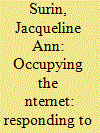

|
|
|
|
|
| Publication |
2010.
|
| Summary/Abstract |
This paper examines how the internet and information communication technology have resulted in a shift in power with regard to who defines and controls content for consumption. Individuals can now take on established institutions in defining and constructing reality; and with the much lower entry point for just about anybody to be a publisher, the traditional media are being contested as never before. At the same time, this shift in power has meant it is also easier to hold media accountable-not a bad thing at all for democracy.
|
|
|
|
|
|
|
|
|
|
|
|
|
|
|
|
| 19 |
ID:
098955
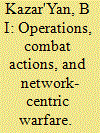

|
|
|
| 20 |
ID:
077133
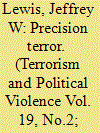

|
|
|
|
|
| Publication |
2007.
|
| Summary/Abstract |
Suicide bombing can be understood as a technology that successfully integrates people, cultures, and hardware into precise, intelligent, lethal weapons systems. Lacking access to the sophisticated electronic guidance systems of their enemies, terrorists have developed a cost-effective alternative technology by using social and cultural pressure to convert human beings into guidance systems for terrorist ordnance. This demonstrates that while terrorists tend to be imitative in their technologies, they can still be effective and difficult to predict. A significant implication that arises from this discussion is that the American tendency to assume that "high-tech" devices will automatically confer an advantage on the United States in the struggle against terrorism should be reconsidered.
|
|
|
|
|
|
|
|
|
|
|
|
|
|
|
|
|
|
|
|
|